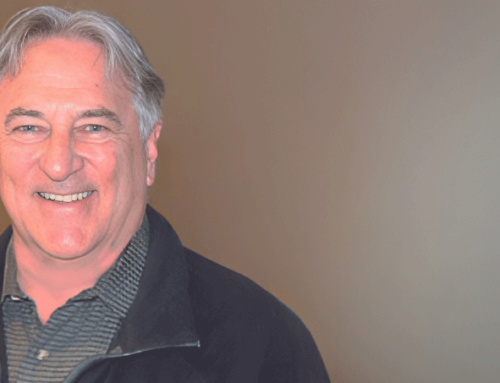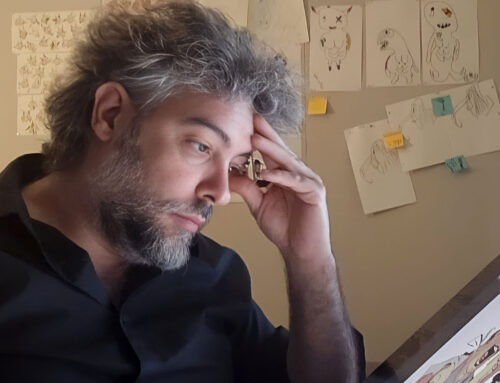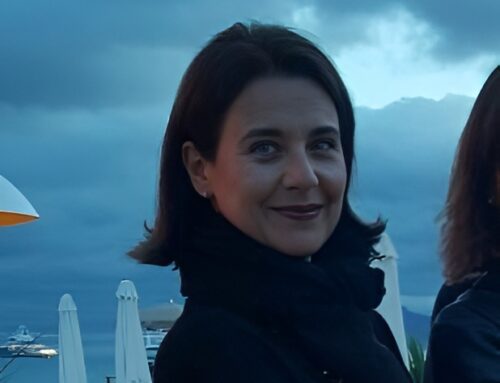Focus on Lionsgate with Sandra Stern
Our periodic meeting with Hollywood’s executives takes us to Sandra Stern, recently appointed Vice Chairman of the Lionsgate Television Group. Stern has been a vital member of the Company’s senior management team for the past two decades. She has helped guide Lionsgate’s television business to record-breaking revenue growth every year of her tenure. She has been instrumental in tripling the size of its television slate, which encompasses dozens of series on a wide array of U.S. networks and platforms.
“I’ve been at Lionsgate for 20 years. When I came, Jon Feltheimer had just come over from Sony Pictures Entertainment to take control of the studio. It was a small company then. I always tell this true story. When I started at Lionsgate, I used to take everybody out to lunch every other Thursday. The entire TV company could sit around a table for six. Now we are still small, but we are about a hundred people in the TV group, and instead of one show, we are doing thirty of them. Instead of having to watch every nickel, we now have the opportunity to take a broader view. We did not have a distribution team when I arrived at Lionsgate; we were a different company then. We functioned as a small independent production firm that aspired to control the material. So, when I look back, I see poverty could be a real opportunity. The chance to see differently because we couldn’t compete with Twenty Century Fox or Warner Brothers, or Sony. We didn’t have the money, and we didn’t have access.”
So what could you do in Hollywood with no money and no access?
We had to find a niche that nobody else was looking at, and we did it. We identified that niche on cable TV. We found cable a fertile field where we could create because there was no competition. Within a month after I arrived at Lionsgate, we produced a series called Weeds on Showtime. It was our first original series. We followed that up with Nurse Jackie, also on Showtime. After that, we did the first original series on AMC, Mad Men. We also produced the first original series for Starz, a show called Crash. Years later, we did the same with streaming.
Is streaming what cable was 20 years ago? The same game-changing opportunity?
There are some differences. We are in a much quicker time right now. Television was pretty much unchanged for fifty years. Then cable peaked with the original series after 15 years, and now streaming is doing so even more rapidly. When I did Orange is the New Black for Netflix or Debby for Hulu, they were the first streaming show. Clearly, that was the new frontier, as cable was for twenty years.
For a while, streaming was the answer to everybody’s question. Lately, things have changed. Subscribers are decreasing, and streamers are cutting their production.
Streaming is finding its feet now. It is a significant platform but only one of many platforms. A little reality came after unchecked optimism when we all thought streaming would be the ultimate answer to all the questions of Hollywood and its money. It wasn’t. I don’t know why people are so surprised that streamers, just everybody else, have to make money. So, a correction doesn’t mean the end of the world. It means rightsizing and correcting. I think we will stay in business with streamers for a long time to come.
How important is the internationalization of the content today?
America is very slow to realize that it is not the center of the universe but is finally getting there. There are many creative and talented people all around the globe, and there are great stories in the world. Americans are now open to good content no matter where it comes from. When you look at Squid Games from Korea or Fauda from Israel, this is the Golden Age for global storytelling. Americans no longer say no, we don’t read subtitles. If it’s a good story, we are open to it. Lionsgate is now looking at the international marketplace as a fruitful storytelling arena. We have adapted international formats. Even now, one of our biggest hits, Ghosts on CBS, is a BBC deal. There are great stories, and long before this BBC venture (we currently have probably twenty projects together), we made a deal with Televisa, Mexico, a joint venture to develop stories based on the telenovelas, adapting them to the American and global marketplace. At Lionsgate, we have always considered the international market a place to make partnerships and find formats to adapt. We currently have deals with Canada and Australia, and we are looking to do more.
What are the needed ingredients for an international TV show?
I wish I had that recipe. But any coproduction depends on collaboration, listening, sharing, and respect, which all our mothers taught us while growing up. Understanding that your partner knows much more about his territories and audience, listening, sharing, and respectfully collaborating is half the job.
Let’s talk about Italian TV shows. Do you have a favorite?
You know what? In a few days, I will take a trip to Italy. I’ll watch TV then, and I’ll be back to you with an answer. The problem is, even if it’s part of my job to watch TV shows, there is so much out there that even if I stay home and watch TV all night and day, I can only watch some of it.
From the Hollywood perspective, is this redundance a pro or a con?
You never say too much of a good thing is bad. Right? But there are issues: in the effort to create scale, scope, and volume, only some things are good. Volume is becoming so important that it sometimes surpasses quality. So, it is essential to create an environment where the best shows are on top and thrive; unfortunately, with that quantity of content, it can be challenging to make that happen. Somebody yesterday at lunch mentioned a show I had never heard of, and I came home, found it, and watched it until I went to sleep. After four episodes, I couldn’t get enough of it. I had never heard of it. It fell through the cracks.
What is the name of the show?
Apple TV+ Shrinking, Harrison Ford and Jason Spiegel playing therapists. Very well done, very well written, and acted. But there is so much over there. In the old days, the channels had only a limited amount of shows they could put on. So, they were very well selected, nowadays it’s not the case and it can be a little overwhelming.
The risk is: quantity could soon decrease because of the looming writers’ strike. The last one was fifteen years ago, when this need for content was less intense.
After COVID, after the shutdown and being unable to work for a while, I’m amazed there is an appetite for a strike. That being said, there are legitimate concerns the writers have. The direction of non-linear TV is taking: shorter seasons, shorter orders, 8 or 10 episodes instead of 22, and more extended production periods, which means that writers are working hard for little more money. That is a legitimate concern. The studios also have issues. Streamers are ordering and paying less for only ten shows. How we resolve that? Talking and being open to the other side’s request, there should be a legitimate compromise somewhere.
The audience now responds to shorter shows, so we must adapt. Because there are so many shows, and so much television out there, the result is that a show gets fewer viewers, which means fewer revenues. So, there are legitimate concerns, but I’ll be very disappointed to have a strike where nobody wins. We all need that respectful collaboration we discussed before, the understanding of the others our mothers taught us.
Aren’t women better at this respectful collaboration?
Women are better at everything.
And this is a mike drop sentence. How did you start this job?
I am a lawyer, but I graduated in comparative literature before going to law school. I studied French, German, Hebrew, and Italian literature. I have always loved storytelling, and when I graduated from law school, I combined my two passion, law and storytelling. I got a job at the predecessor of Sony, Columbia Picture Television, in the legal department, and I moved from legal to business to management and worked my way up.
Do you have a tip for someone wanting to try an entertainment career?
Be relentless. Knock at every door and keep knocking. Figure out how to get your foot in the door, and once in, work hard, and be collaborative, honest, and caring.
Share:
Our periodic meeting with Hollywood’s executives takes us to Sandra Stern, recently appointed Vice Chairman of the Lionsgate Television Group. Stern has been a vital member of the Company’s senior management team for the past two decades. She has helped guide Lionsgate’s television business to record-breaking revenue growth every year of her tenure. She has been instrumental in tripling the size of its television slate, which encompasses dozens of series on a wide array of U.S. networks and platforms.
“I’ve been at Lionsgate for 20 years. When I came, Jon Feltheimer had just come over from Sony Pictures Entertainment to take control of the studio. It was a small company then. I always tell this true story. When I started at Lionsgate, I used to take everybody out to lunch every other Thursday. The entire TV company could sit around a table for six. Now we are still small, but we are about a hundred people in the TV group, and instead of one show, we are doing thirty of them. Instead of having to watch every nickel, we now have the opportunity to take a broader view. We did not have a distribution team when I arrived at Lionsgate; we were a different company then. We functioned as a small independent production firm that aspired to control the material. So, when I look back, I see poverty could be a real opportunity. The chance to see differently because we couldn’t compete with Twenty Century Fox or Warner Brothers, or Sony. We didn’t have the money, and we didn’t have access.”
So what could you do in Hollywood with no money and no access?
We had to find a niche that nobody else was looking at, and we did it. We identified that niche on cable TV. We found cable a fertile field where we could create because there was no competition. Within a month after I arrived at Lionsgate, we produced a series called Weeds on Showtime. It was our first original series. We followed that up with Nurse Jackie, also on Showtime. After that, we did the first original series on AMC, Mad Men. We also produced the first original series for Starz, a show called Crash. Years later, we did the same with streaming.
Is streaming what cable was 20 years ago? The same game-changing opportunity?
There are some differences. We are in a much quicker time right now. Television was pretty much unchanged for fifty years. Then cable peaked with the original series after 15 years, and now streaming is doing so even more rapidly. When I did Orange is the New Black for Netflix or Debby for Hulu, they were the first streaming show. Clearly, that was the new frontier, as cable was for twenty years.
For a while, streaming was the answer to everybody’s question. Lately, things have changed. Subscribers are decreasing, and streamers are cutting their production.
Streaming is finding its feet now. It is a significant platform but only one of many platforms. A little reality came after unchecked optimism when we all thought streaming would be the ultimate answer to all the questions of Hollywood and its money. It wasn’t. I don’t know why people are so surprised that streamers, just everybody else, have to make money. So, a correction doesn’t mean the end of the world. It means rightsizing and correcting. I think we will stay in business with streamers for a long time to come.
How important is the internationalization of the content today?
America is very slow to realize that it is not the center of the universe but is finally getting there. There are many creative and talented people all around the globe, and there are great stories in the world. Americans are now open to good content no matter where it comes from. When you look at Squid Games from Korea or Fauda from Israel, this is the Golden Age for global storytelling. Americans no longer say no, we don’t read subtitles. If it’s a good story, we are open to it. Lionsgate is now looking at the international marketplace as a fruitful storytelling arena. We have adapted international formats. Even now, one of our biggest hits, Ghosts on CBS, is a BBC deal. There are great stories, and long before this BBC venture (we currently have probably twenty projects together), we made a deal with Televisa, Mexico, a joint venture to develop stories based on the telenovelas, adapting them to the American and global marketplace. At Lionsgate, we have always considered the international market a place to make partnerships and find formats to adapt. We currently have deals with Canada and Australia, and we are looking to do more.
What are the needed ingredients for an international TV show?
I wish I had that recipe. But any coproduction depends on collaboration, listening, sharing, and respect, which all our mothers taught us while growing up. Understanding that your partner knows much more about his territories and audience, listening, sharing, and respectfully collaborating is half the job.
Let’s talk about Italian TV shows. Do you have a favorite?
You know what? In a few days, I will take a trip to Italy. I’ll watch TV then, and I’ll be back to you with an answer. The problem is, even if it’s part of my job to watch TV shows, there is so much out there that even if I stay home and watch TV all night and day, I can only watch some of it.
From the Hollywood perspective, is this redundance a pro or a con?
You never say too much of a good thing is bad. Right? But there are issues: in the effort to create scale, scope, and volume, only some things are good. Volume is becoming so important that it sometimes surpasses quality. So, it is essential to create an environment where the best shows are on top and thrive; unfortunately, with that quantity of content, it can be challenging to make that happen. Somebody yesterday at lunch mentioned a show I had never heard of, and I came home, found it, and watched it until I went to sleep. After four episodes, I couldn’t get enough of it. I had never heard of it. It fell through the cracks.
What is the name of the show?
Apple TV+ Shrinking, Harrison Ford and Jason Spiegel playing therapists. Very well done, very well written, and acted. But there is so much over there. In the old days, the channels had only a limited amount of shows they could put on. So, they were very well selected, nowadays it’s not the case and it can be a little overwhelming.
The risk is: quantity could soon decrease because of the looming writers’ strike. The last one was fifteen years ago, when this need for content was less intense.
After COVID, after the shutdown and being unable to work for a while, I’m amazed there is an appetite for a strike. That being said, there are legitimate concerns the writers have. The direction of non-linear TV is taking: shorter seasons, shorter orders, 8 or 10 episodes instead of 22, and more extended production periods, which means that writers are working hard for little more money. That is a legitimate concern. The studios also have issues. Streamers are ordering and paying less for only ten shows. How we resolve that? Talking and being open to the other side’s request, there should be a legitimate compromise somewhere.
The audience now responds to shorter shows, so we must adapt. Because there are so many shows, and so much television out there, the result is that a show gets fewer viewers, which means fewer revenues. So, there are legitimate concerns, but I’ll be very disappointed to have a strike where nobody wins. We all need that respectful collaboration we discussed before, the understanding of the others our mothers taught us.
Aren’t women better at this respectful collaboration?
Women are better at everything.
And this is a mike drop sentence. How did you start this job?
I am a lawyer, but I graduated in comparative literature before going to law school. I studied French, German, Hebrew, and Italian literature. I have always loved storytelling, and when I graduated from law school, I combined my two passion, law and storytelling. I got a job at the predecessor of Sony, Columbia Picture Television, in the legal department, and I moved from legal to business to management and worked my way up.
Do you have a tip for someone wanting to try an entertainment career?
Be relentless. Knock at every door and keep knocking. Figure out how to get your foot in the door, and once in, work hard, and be collaborative, honest, and caring.











